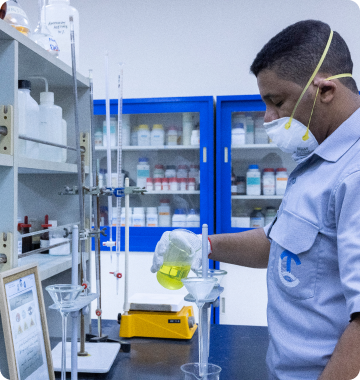Products and Laboratories Check
Quality Management / Consumer Education Program
Dear Tabuk Cement Company Client: Please note that the production lines in our factory are currently focusing on three main types of cement, which follow international standards and conform to Saudi standards, as follows:
Cement Tabuk Company has three types of cement:
Type I: Portland Cement, ordinary:
- Applications: Plain concrete mixing which does not require special types of cement (which require high durability).
- Usage examples:
- Ready Mixed Concrete
- Bases and foundations
- Concrete casts in cold conditions
- Bridges and towers construction
- Concrete roads
Type II: Sulphate Resisting Cement:
- This type of cement is different from the rest of types because it is characterized by the low content of tricalcium aluminate, which in turn is responsible for the reactions with sulphate ions in the soil or in the water, which prevents the expansion of the concrete and causes cracks in areas with a high content of sulphates.
- Usage examples:
- Concrete pipes exposed to water with high sulfur content (such as marshes and sewage).
- Marine works such as ports, jetties and coastal roads (which require high durability).
- Basis and foundations (which require high durability).
- Sewage plants (structural bases and foundations).
Type III: Pozzolan Portland Cement:
- Specifications of this type of cement are different from the other types, where it consists of 70% – 80% of Portland Cement, in addition to 15% – 20% of black pozzolan, which is 100% Natural aluminous silicon volcanic materials. These materials are taken from volcanic mountains directly, and are not exposed to any chemical reactions or additions, and are therefore recommended to be used, where there are no damages or deficiencies of their various applications,
Applications:
Pozzolan Portland Cement is recommended to be used in areas contain high levels of dissolved salts, cement and construction industries, and in infrastructure projects in regions with sandy soil containing free silica, such as Tabuk region and the northern regions of Saudi Arabia (Which does not require high durability such as normal Portland Cement or Sulfate Resisting Cement).
Characteristics and advantages of Pozzolan Portland Cement:
- Plays a role in making cement pulp elastic and flexible (Internal and external finishings)
- Reduces the heat generated from the first stage of adding water.
- Can prevent alkaline interaction on the block surface.
- Reduces the permeability because of its high fineness.
- Improves plastic properties and cohesion.
- Works as a heat insulator and helps to reduce electricity consumption for lighting and air-conditioning.
- Absorbs noise and helps with soundproofing, which reduces voice echo.
- Fireproof, because pozzolan contains silica and alumina, which make it more resistant to high temperatures which resulted by fires. This explains why chimneys and furnaces are built using this type of cement.
- This type of cement is healthy, clean and eco-friendly because it consists of natural materials that do not contain organic materials, have no odor and do not release toxic gases when exposed to high temperatures.
- Resists salts, so it is used in the construction of facilities carried out on the shores of seas close to salt water or soil with high levels of dissolved salts, which do not require high durability.
- weatherproof over time, its usage for the construction of archaeological and historical facilities which is built using volcanic rocks, especially the ancient Roman palaces, is the best proof of that.
Usage examples:
- Block-yards
- Concrete pipes exposed to water with high sulfur content (such as marshes and sewage, which do not require high durability).
- Small sewage plants
- Small bridges used for discharging flood waters in causes cracks in areas with a high content of sulphates and silica, such as the northern regions, Jeddah and Madinah


